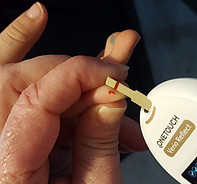There is a lot involved in properly managing diabetes and I was wondering about Vitamins and Diabetes. Is there any benefit to diabetics taking a multivitamin supplement?
You spend so much time trying to ensure you eat a well-balanced meal plan, getting regular exercise, and following your diabetes care plan as set forth by your doctor.
Would adding a vitamin supplement help in your daily care or not?
Are you certain you are getting all the nutrients you need in your diet?
Will taking a multivitamin to affect your blood glucose positively or negatively?
Because children don’t necessarily eat all the food they are given for meals would a multivitamin be a good way to ensure they get the nutrition they need each day?
I decided to find the answers to these questions and thought I would share them with you all.
Table of Contents
How Vitamins and Minerals Work
To decide whether we should take a multivitamin supplement we first need to understand how vitamins and minerals work and why our body needs them.
Well to begin with your body needs a wide range of vitamins and minerals to function properly and keep you alive and healthy.
Here are some ways your body puts vitamins and minerals to use daily:
- breaks down the protein, carbohydrates, and fat in food to give you the energy needed to keep your heart beating, lungs breathing and you moving
- regulates blood sugar and insulin sensitivity
- producing new cells
- maintaining a strong immune system
- ensuring skin, eyes, teeth, bones, muscles, brain and everything else is healthy
Not enough of a single nutrient can sometimes create intense and permanent consequences.
We try to eat a well-balanced diet and get most of the nutrients from the food we eat but do we actually get everything we need?
A multivitamin is not intended to replace a healthy diet but to add to it any vitamins or minerals that may be lacking.
The best multivitamin for a diabetic will ensure proper nutrition and work with your diabetes care plan to help maximize your body’s efficiency at controlling your blood glucose levels.
Be sure to consult with your doctor about whether taking a multivitamin daily may benefit you.
Why Consider a Vitamin Supplement

A perfect diet may give you all the vitamins and minerals you need but realistically who actually eats a perfect diet.
Yes, we do our best to eat healthily but we could still be lacking some important vitamins or minerals.
Taking a multivitamin is kind of like having insurance, so if your diet does happen to miss a few vitamins or minerals your body will still get what it needs.
Keep in mind taking a vitamin does not give you free rein to eat unhealthy food.
Some vitamins or minerals may be difficult to get from diet alone.
Some people follow a vegan or vegetarian diet, this could make them deficient in B12.
Someone who doesn’t drink milk or eat fatty fish could not be getting enough vitamin D.
It is because diet alone can so easily be short of certain key nutrients that a multivitamin supplement makes sense.
Choosing a Multivitamin
It is important to remember you need both vitamins and minerals. There are 13 vitamins and over 16 minerals that our
bodies need in varying amounts.
It is important to read the supplement facts table to ensure the multivitamin has all the vitamins and at least some minerals. Don’t assume that because it is a multivitamin it has everything. Always read labels.
When checking the nutrients in your supplement consider:
- calcium and vitamin D are important for diabetics because they are at a higher risk for osteoporosis and bone fractures
- anemia is quite common in both men and women so iron is important but not too much as that can be toxic
- potassium is important for blood sugar control and heart health. Best to get potassium from vegetables, fish, yogurt, beans, and fruit
- vitamin B12 deficiency can lead to neuropathy also those who take metformin are also at a higher risk
- chromium (chromium picolinate) may improve glucose intolerance
- selenium deficiency is linked to diabetes risk
- folic acid is important for heart health
Try to look for a “high potency” multivitamin and mineral supplement and ask your doctor for recommendations on what type to take.
Take your supplement daily as directed and choose high- nutrient foods.
Keep in mind that some vitamins and minerals can actually worsen diabetes symptoms so don’t start taking anything without consulting with your doctor first.
Also, remember that no supplement can replace a healthy well-balanced diet.
Incorporating It into Your Daily Routine
 Like any other part of Diabetes Management taking a multivitamin:
Like any other part of Diabetes Management taking a multivitamin:
- becomes easier the more you practice it
- is part of a long term health strategy
- assists the other portions of your diabetes care
- is more effective alongside other healthy lifestyle choices
- get regular exercise
- limit salty and processed foods to help keep blood pressure down
- include plenty of high fiber foods to support the heart-healthy benefits of the folic acid and B12 in your multivitamin
It might help you remember to take your multivitamin if it coincides with something else you do daily. For example, by making it part of your breakfast routine you may find it easier to remember to take it.
Conclusion
After considerable research, I have concluded that yes Vitamins and Diabetes can work together.
Adding a multivitamin supplement can absolutely help you ensure you are getting all the nutrients you need daily and this can help you manage your blood glucose levels more easily.
It is important to ask your doctor if you should take a multivitamin and which specific nutrients he wants you to look out for.
Always follow your doctor’s recommendations and diabetes care plan.
The best multivitamins for diabetics will help give your body what it needs for maintaining your overall health while improving your ability to maintain blood glucose within the target range as set forth by your health care team.
Naturally, supplements are intended to work with other healthy lifestyle choices and are not intended to replace healthy choices.
The better you can maintain your overall health the easier it will be to manage your blood glucose levels.
Thanks for dropping by, feel free to drop a comment below and let me know how you are making out with or without a daily multivitamin.


Great post! My husband has diabetes and a poor diet and I´ve been suggesting for a while that he should take multivitamins and minerals to feel generally better. The point you make about some being bad though is good to know and we will ask the doctor next time we see him. Thank you for this very interesting post 😀
Thanks for commenting Susan. Any time a diabetic is considering dietary changes even by including supplements or vitamins they need to consult their doctor. Absolutely everything a diabetic ingests can have an effect on their blood glucose levels and may require altering their medications or insulin dosing. Best of luck to you and your husband. Take care.